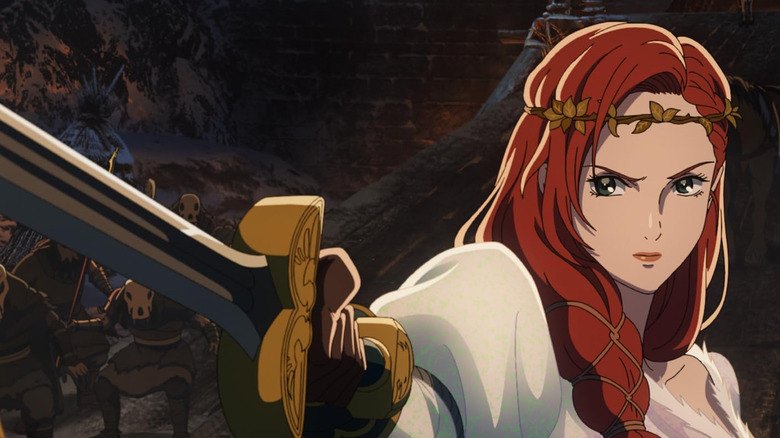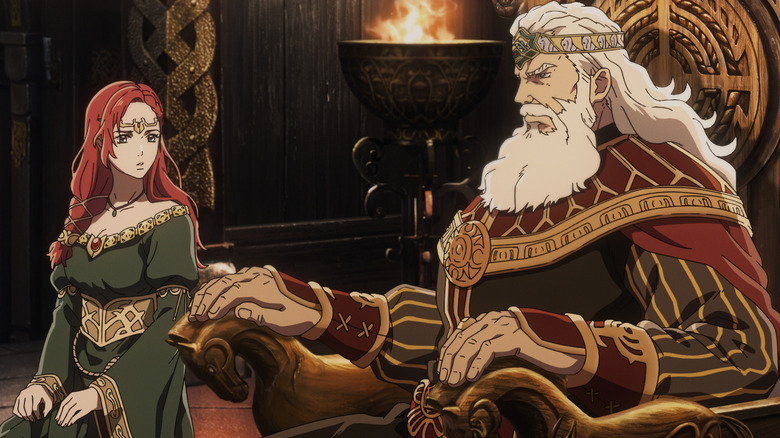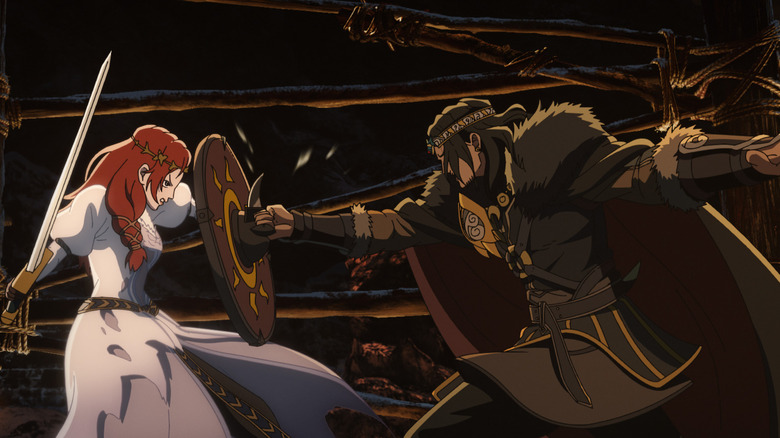The War Of The Rohirrim Review: The Lord Of The Rings Goes Anime In Dazzling, But Inessential Prequel
Of all the blockbusters to receive the never-ending franchise revival treatment, "The Lord of the Rings" was always going to be the toughest nut to crack. Prime Video found this out the hard way with their "The Rings of Power" streaming series, seemingly unprepared for the feedback from a (let's call it passionate) fanbase that might as well have multiple PhDs in J.R.R. Tolkien apologia and never take kindly to deviations from established canon. And as anyone who sat through the mind-numbing "The Hobbit" trilogy can attest, we've already seen what happens when the fine line between art and commerce isn't merely crossed, but obliterated. In that sense, Middle-earth is the furthest thing from the mystical realm of Shambhala, blissfully isolated from Hollywood getting its grubby little hands on it. It's over a decade too late for that, I'm afraid.
So it falls upon "The War of the Rohirrim" to defy expectations as a franchise expansion utterly unlike any other — especially from a studio run by David Zaslav. (On the other hand, "The Hunt for Gollum" and the other movies to follow would seem to be right up their alley.) The goal of maximizing profits over all else doesn't exactly jive with choosing an anime prequel as the newest spinoff from Peter Jackson's acclaimed original trilogy. Nor does it make much business sense to adapt a niche story for a mass audience of moviegoers. Somehow, against all odds, that's exactly what's happened here.
It's equally as surprising, then, that this curio is more of a mixed bag than an outright disaster or an unqualified masterpiece. Instead, it's stuck in an awkward liminal space between extremes. "The War of the Rohirrim" is a dazzling feast for the eyes, delivering stunning visuals like nothing we've ever seen in "The Lord of the Rings" before. The new characters all make instant impressions and undergo satisfying arcs, caught up in an interfamily drama worthy of any Shakespearean tragedy. And as soon as the first violin strings of Howard Shore's distinctive Rohan theme kick in, it's as if no time at all has passed since we last visited the rolling plains of the horse-lords. Yet, for everything this venture has going for it, "The War of the Rohirrim" is too small-scale to feel properly epic. It never escapes the sinking realization that none of this becomes as visceral, essential, or event-sized as the previous movies.
By the time this (mostly) self-contained and standalone chamber piece wraps up, even the nerdiest of fans might be left wondering where we go from here.
The War of the Rohirrim is a frustrating mix of great visuals and a disappointing script
Set nearly 200 years before the events of "The Lord of the Rings," "The War of the Rohirrim" is at a severe disadvantage compared to its predecessors. Lacking a fully-fledged trilogy of books to pull from, the prequel instead dives deep into the depths of the appendices to adapt a little-known chapter in Tolkien lore. At this point in time, the country of Rohan shares an uneasy peace between its fair-skinned, Scandinavian-coded, horse-riding warriors (one axe-wielding royal prince is practically Middle-earth's answer to the Norse god Thor) and the Dunlendings, a group of sour-faced rivals whom we know are the bad guys because, well, they're all dark-skinned, surly, and dare to have misgivings over their status as second-class citizens. Unfortunate fantasy tropes aside, this powder keg threatens to blow up the rulership of the proud King Helm (voiced by Brian Cox) and the fate of his freewheeling daughter Hèra (Gaia Wise). When word reaches overambitious Freca (Shaun Dooley) that the potential key to the throne has been promised in marriage to another, he recklessly proposes a match of his own: his brooding son and Hèra's childhood friend Wulf (Luke Pasqualino). The consequences of this brazen act turn out to be nothing less than all-out war.
If that seems like a lot of fantasy exposition to throw at viewers, the solution feels representative of so many of the film's strengths and weaknesses. Much of this is explained in voiceover by Miranda Otto, reprising her role as the noblewoman of Rohan Éowyn in the original trilogy. To the credit of director Kenji Kamiyama and writers Phoebe Gittins and Arty Papageorgiou (with Jeffrey Addiss and Will Matthews sharing co-writing honorifics from an earlier draft of the script), this approach lends a mythological tone to the entire story. After all, what better way to evoke the idea of an ancient legend told around a campfire and passed down to future generations? This falls painfully short, however, when the narration oftentimes ends up as a storytelling crutch for an awfully inconsistently-paced journey. We're told everything from complicated backstories to emotional states of mind of our main protagonists to basic plot details like the passing of time — most of which we could've picked up on our own simply by paying attention.
What makes this so frustrating is that, even with these issues, few can deny the sheer artistry poured into every single second of the 134-minute runtime. The 2D animation is frequently stunning to look at, bringing to mind the vibrant colors and compositions of the Rankin/Bass or Ralph Bakshi animated "The Lord of the Rings" movies. Although an unconventional pick for a project like this, Kamiyama brings an unabashed embrace of anime (the laws of physics are sometimes thrown out the window, making for uniquely thrilling moments of action) and a singular talent for framing every shot with clarity and purpose. And though the score never reaches the heights of Howard Shore's music, composer Stephen Gallagher crafts a solid themes for Hèra while weaving in cues from the originals. The actual set pieces are few and far between, but action fans will be pleased by the film's willingness to include shocking moments of gore and violence when necessary.
The War of the Rohirrim pits a hero you'll love against a villain you'll love to hate
If the narrative structure leaves something to be desired, at least the individual characters of "The War of the Rohirrim" fare significantly better. Hèra is our eyes and ears into this comparatively thin slice of Middle-earth, providing a hero obviously patterned after Éowyn yet still her own person. This is someone who's more suited for a saddle than trapped in royal attire at court; a gentle spirit, but headstrong; independent and unwilling to marry, but fiercely devoted to her family and friends (like her wizened handmaiden Olwyn, voiced by Lorraine Ashbourne, or Bilal Hasna's bumbling, scene-stealing squire Lief). Wise voices Hèra with a charming lilt and a mischievous air, rarely projecting to the back of the room when a soft-spoken word will do. That's much more apt for Pasqualino as the arrogant and dishonorable Wulf, the sullen man-child whose affection for Hèra has since curdled into hate.
Whatever else might be said about the overall production, the blistering dynamic between the two makes their every heated conversation and every battle of wits into appointment viewing — and, yes, a match made in heaven for all the shippers among us, too. But where "The War of the Rohirrim" truly sings is in its interpretation of what's actually at the heart of the war between the Dunlendings and the Rohirrim. Freca and Wulf are as obviously evil as evil gets, but the most interesting addition comes from the creative team's perspective of Helm. A mountain of a man and basically a figure straight out of myth, the King of Rohan is unlike any other we've met before. Obstinate and overbearing to a fault, it's his own pride and ego that sets off the war in the first place and eventually causes their retreat to the wintry fortress of the Hornburg — more so than even the scorned Wulf and the wounded masculinity he spends the rest of the film nursing. Heroes, villains, and those somewhere in between all but jump off the screen from the moment they arrive.
Still, as much as "The War of the Rohirrim" tries its best to live up to the lofty standards set by the original movies, it only really shines when it manages to forget that it's a franchise movie at all. Fans will no doubt devour the buffet of Easter eggs, cameos, and references (some more ham-fisted than others) on display. For a story as chock-full of tragedy, betrayal, and glorious battle scenes as this one is, however, far too much of the material comes across like diet "The Lord of the Rings." Is that enough for casual viewers? There's an argument to be made that this template should be the way forward for this franchise. After all, brand-new characters and fresh stories should be infinitely preferable over a "Gollum" movie or whatever else WB has up their sleeves.
If this is just the first of many spin-offs to come, we can only hope future efforts learn all the right lessons from "The War of the Rohirrim." So where does the franchise go from here? All I know is that it'd be a shame to let the riskiest "The Lord of the Rings" movie in years scare us right back to safer shores.
/Film Rating: 6 out of 10
"The Lord of the Rings: The War of the Rohirrim" opens in theaters December 13, 2024.


